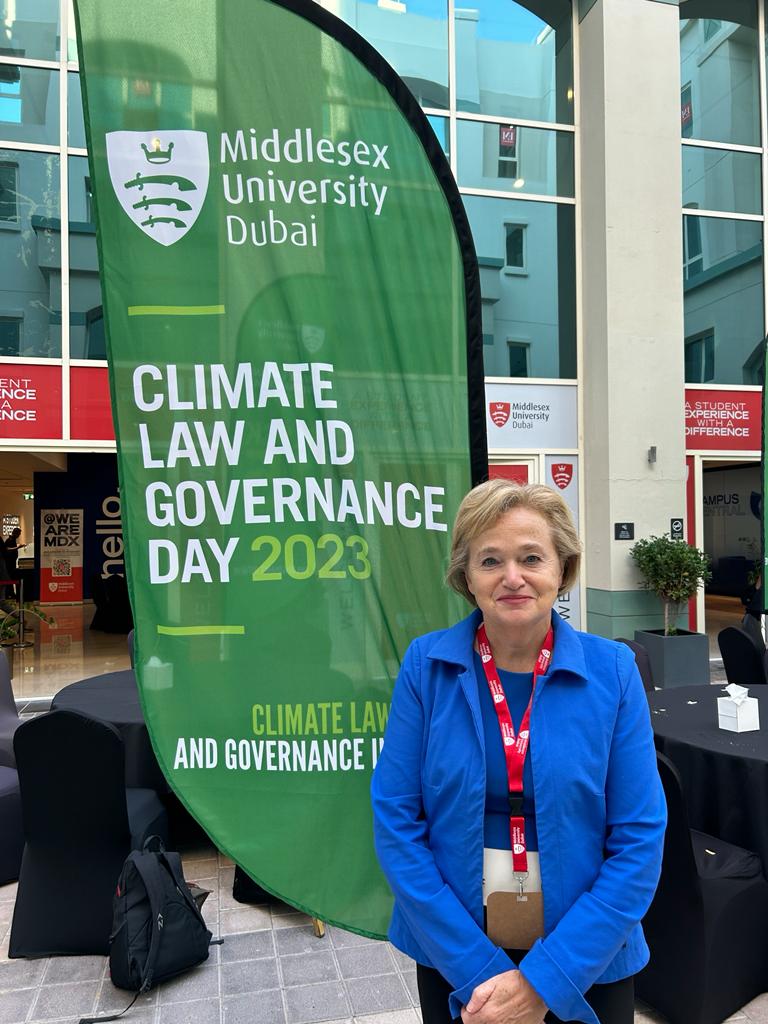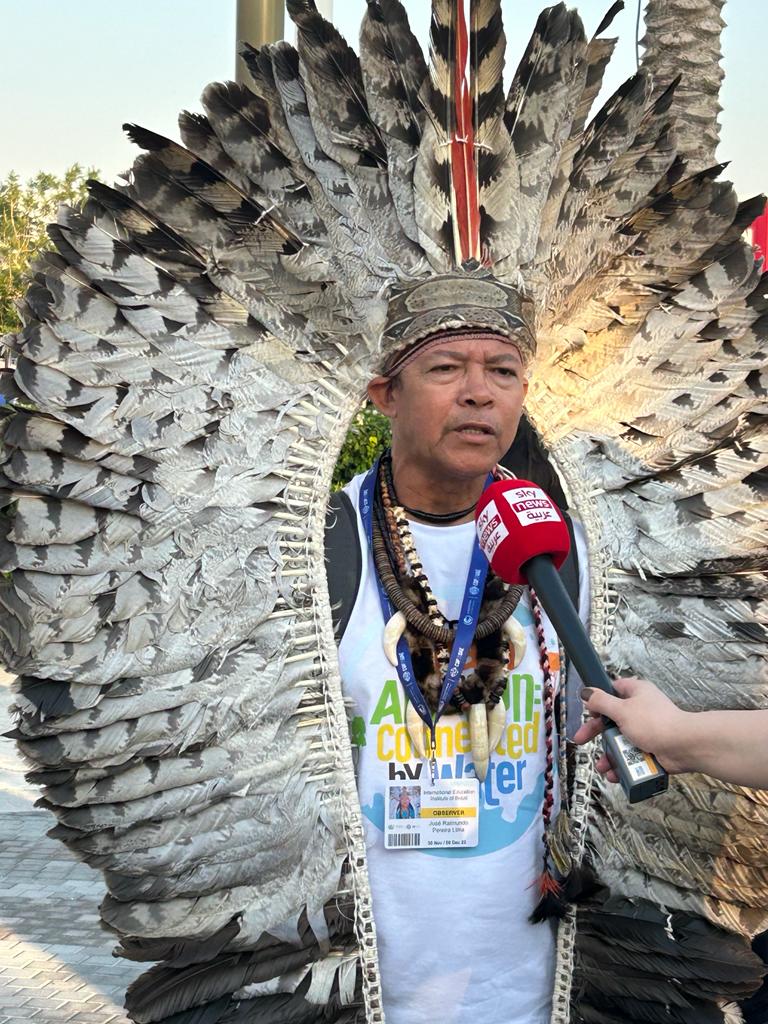By Caroline May, Co Chair, Legal Sustainability Alliance
“The earth does not belong to us, we belong to the earth.”
The words of King Charles on opening COP 28 in Dubai last week. I arrived for the opening day amid a crowd of 70,000 people queuing to enter the Blue zone at the vast Expo complex 20 miles south of the City. A bewildering mix of royalty, world leaders, business leaders, NGO’s, Government delegations and representatives of communities most affected by climate change. It would be hard to imagine such an eclectic group gathering for any other reason.

However the climate imperative draws everyone together for diplomatic negotiations, public pledges, innovation and funding launched, and providing a voice to those often forgotten. There is an increasing business presence at these events and that is important. The role of climate finance is essential in driving change. Law has an important role to play providing frameworks in which climate conscious actions are incentivised, rewarded and as needed penalised.
I spoke at the Climate Law and Governance day hosted by the Universities of Dubai, Cambridge and Middlesex at their sparking campus. My subject was the role of EU law and the profession generally in driving change as the guest of EBRD. Topics covered during a whole day of legal presentations included climate finance and trade, carbon taxes and carbon credits and greenwashing risks. It was good to bump into so many LSA members!
I also spoke on a panel at the ICUN pavilion about the Law Society guidance on The Impact of Climate Change on Solicitors in England & Wales. The consensus of our panel of international Bar Associations including the IBA, ABA and Brazilian Bar was that the official UNFCC timetable for COP should include a Law Day and we will lobby hard for that to be on the agenda for COP 29.
If you have been following the news from COP you will have seen the major pledges. I set out in summary the key ones below.
- Firstly, the main issue which delayed agreement on the COP28 text is language on fossil fuels. The final agreement calls for the “phase-down of unabated coal power” and the transition “away from fossil fuels in energy systems, in a just, orderly and equitable manner… so to achieve net zero by 2050 in keeping with the science.” It’s not what most developed countries (and climate activists) had been calling for, but is still a major achievement. The final text is yet to be officially released.
- The loss and damage fund, first agreed at COP27, was launched this year with a series of major pledges. The biggest funders thus far are Italy and France, each donating $108.9 million, and the UAE and Germany, both promising $100 million. It will be hosted by the World Bank, at least for its first four years. A complete list of countries that have donated to the fund can be found here.
- 130 countries signed onto a pledge to triple the world’s renewable energy capacity and double the global average annual rate of energy efficiency improvements every year until 2030. Whilst the US and EU have both signed, India and China are yet to do so. For more information on why this is such a significant achievement, especially in relation to the energy efficiency element, see the article from Energy Monitor linked here.
- 52 oil and gas companies, representing 40% of global oil production, have joined the Oil and Gas Decarbonization Charter. The group, which includes Saudi Aramco and ExxonMobil are promising to make their operations net-zero by 2050 and to eliminate routine flaring by 2030. More info here.
- More than 20 countries, including the US, UK, Australia and Japan, have pledged to triple their nuclear energy capacity by 2050, by building new plants and prolonging the lives of existing ones. This will be tricky, not only requiring a major scale-up of the sector in many of the signatory countries but also addressing the fact that Russia is currently the only significant producer of one of the most crucial forms of uranium used in nuclear reactors, amongst other difficulties explained in greater detail here.
- 10 countries, including the US, joined the Powering Past Coal Alliance (PPCA), which requires signatories to phase out unabated coal power generation and set a moratorium on new coal power stations. The PPCA declaration can be read in full here.
- 158 countries signed the UAE Declaration on Sustainable Agriculture, Resilient Food Systems and Climate Action, which calls on governments to scale up the adaptation and resilience of food producers and promote food security and nutrition. Concerns over the stability of global food systems has risen to the foreground in recent years so this decision is a notable success. The declaration can be read in full here.
- The Green Climate Fund (GCF) received additional pledges, making this round of replenishment funding its most successful yet. The largest donation came from the US ($3 billion) with Australia and Italy also donating substantial amounts. The full list of new GCF pledges announced at COP can be found here.
- Several organisations took the opportunity to publish landmark studies or reports, including the Global Tipping Points Report from the Global Systems Institute. This argues that five major tipping points are already at risk of being crossed and three more are threatened in the 2030s. The full report can be read here.
- In relation to methane emissions, this year several more countries joined the Global Methane Pledge which aims to reduce global methane emissions by 30 percent by 2030 (against 2020 levels). New signatories include Turkmenistan and Kazakhstan, two of the world’s largest methane emitters. Furthermore, more than $1 billion in funding for the Methane Finance Sprint was announced at COP28, to fund physical infrastructure and policy action. When first set-up by Biden in April 2023, his stated goal was for the fund to reach $200 million.
As I leave the sunshine of Dubai intense negotiations continue regarding the terminology of ‘phase down’ or ‘phase out’ of fossil fuels and Article 6 re carbon credit mechanisms. Biodiversity credits were also high on the agenda this year but it’s clear there is still a long way to go. This area in particular offers hope to developing economies rich in natural resources but poor in financial ones.
More to come in this space.
In the meantime I leave you with some pictures of the sights and sounds of COP 28. A mad, diverse cornucopia of mankind but all united to try to align the earth globally to net zero. A noble if complex and challenging cause, but one which has an undeniable imperative for all of us. Until COP 29 …..







